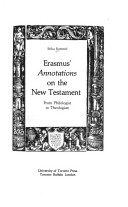Heritage
1 total work
Without the notes, Erasmus said, the texts of the Scripture were 'naked and defenceless, ' open to criticism by uncomprehending readers and corruption by careless printers. The "Annotations" represent not only Erasmus' defence of the New Testament against such abuss, but also a reflection of his own philosophy, objectives, and working methods.In establishing the text and defending it against his opponents, Erasmus drew on manuscript sources, classical literature, patristic writings, scholastic exegesis, and the work of his immediate forerunners, Valla and Lefevre. He did not hesitate to point out the errors of illustrious writers like Jerome and established medieval authorities like Peter Lombard. In general he was appreciative of the early church Fathers and contemptuous of medieval commentators.As well as discussing the contents and aims of the "Annotations," Erika Rummel investigates Erasmus' development from philologist to theologian and traces the prepublication history of the New Testament. She examines the critical reaction of conservative theologians to Erasmus' work and his replies, incorporated in later editions of the "Annotations." The book ends by suggesting a wider field of research: the relationship between the "Annotations" and the corpus of Erasmian apologetic works.
